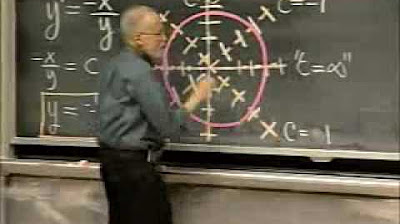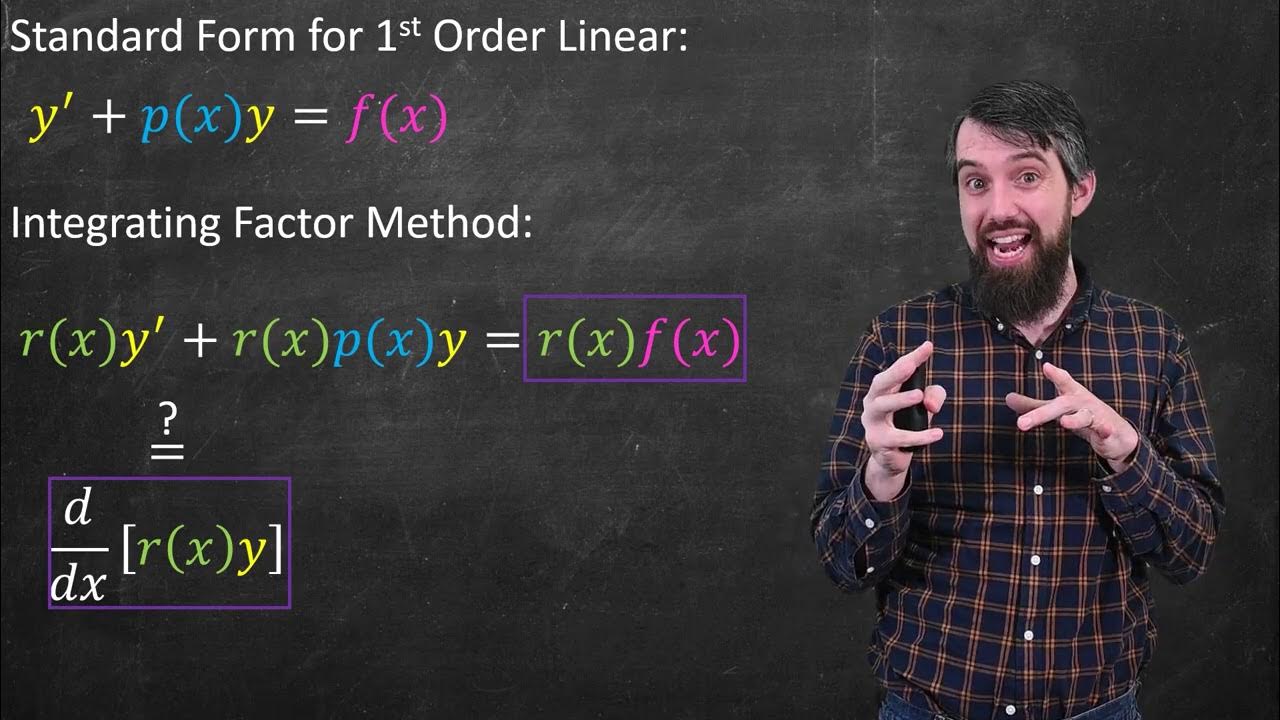Ordinary Differential Equations 1 | Introduction
TLDRThis video series introduces viewers to the fascinating world of ordinary differential equations (ODEs), which are not only a cornerstone of mathematics but also integral to various scientific disciplines. The series begins by illustrating a simple ODE, f'=f, and its solution, the exponential function f(x) = e^x. It then poses several key questions about solving ODEs, including how to approach them without prior knowledge of the solution, the uniqueness of solutions, and the domain of solutions. The prerequisites for understanding ODEs are outlined, emphasizing the importance of real analysis and linear algebra. The series promises to cover systems of ODEs, practical solution methods, and the theory behind the existence and uniqueness of solutions, with a special focus on linear ODEs and the role of the matrix exponential function. The host expresses gratitude to supporters and invites viewers to explore additional resources for a deeper understanding of the subject.
Takeaways
- 📚 This video series is designed for those interested in the theory and solution methods of ordinary differential equations (ODEs), which are crucial for various scientific disciplines.
- 🔍 The script introduces a simple ODE example, f'=f, which is solved by the exponential function f(x) = e^x, highlighting the concept of derivatives being equal to the function itself.
- ❓ The series aims to address fundamental questions about ODEs, such as how to find solutions without prior knowledge, the uniqueness of solutions, and the domain of definition for solutions.
- 🙌 Acknowledgment is given to supporters who make the freely available course possible, with additional rewards like quizzes and PDF versions offered to them.
- 📈 Prerequisites for understanding ODEs include knowledge of real analysis (derivatives) and linear algebra (vector calculations), with suggestions to watch specific video courses for these topics.
- 🏫 For beginners in mathematics, it is recommended to start with the 'start learning mathematics' course to grasp foundational concepts like notations, numbers, and sets.
- 🚫 The course will not cover multivariable calculus or partial derivatives, focusing solely on ordinary derivatives.
- 🌌 Examples from physics are used to motivate the importance of ODEs, such as describing a harmonic oscillator and the gravitational interactions between planets.
- 🔗 The script discusses how the equations for different planets are interconnected through gravitational forces, forming a system of differential equations.
- 📝 The course outline includes discussions on systems of ODEs, practical solution methods, the existence and uniqueness of solutions, and the role of the matrix exponential function in linear ODEs.
- 📅 The next step is to delve into important definitions in the upcoming video, marking the beginning of the theoretical exploration of ODEs.
Q & A
What is the main focus of this video series?
-The video series focuses on the theory of ordinary differential equations (ODEs) and how to solve them, which is important for mathematics and various science subjects.
What does the differential equation f'=f represent?
-The equation f'=f represents a search for a differentiable function f whose derivative is equal to the function itself, with the exponential function f(x) = e^x being a solution.
What are some common questions that arise when dealing with differential equations?
-Common questions include how to solve an equation without knowing the solution, the uniqueness of the solution, the domain of definition for a solution, and whether it can differ for different solutions.
What are the prerequisites for understanding the content of this video series?
-The prerequisites include knowledge of derivatives (real analysis) and the ability to calculate with vectors (linear algebra). For those new to mathematics, it's suggested to start with a foundational course on mathematics.
Why does the video mention complex numbers in the context of physics?
-Complex numbers may be used in physics for calculations related to harmonic oscillators, and understanding them can be helpful, especially when dealing with certain equations that include a minus sign.
What is a harmonic oscillator in physics?
-A harmonic oscillator in physics is a system that experiences a restoring force proportional to the displacement from its equilibrium position, often described by the equation x'' = -ω²x.
How are ordinary differential equations used to describe the motion of planets due to gravity?
-In the context of planetary motion, ODEs are used to model the force of gravity acting on each planet, leading to a system of interconnected differential equations that describe the motion of each planet in three dimensions.
What does the term 'system of differential equations' refer to?
-A system of differential equations refers to a set of multiple differential equations that are interconnected, often arising in complex problems such as modeling the motion of multiple objects under mutual forces.
Why is the order of derivatives considered not so important in the theory of ordinary differential equations?
-While higher-order derivatives do appear in certain problems, the fundamental theory of ODEs focuses on the properties of the equations and their solutions, which are not fundamentally altered by the order of the derivatives involved.
What will be covered in the upcoming videos of the course?
-The course will cover systems of differential equations, practical solution methods for ODEs, the existence and uniqueness of solutions, the conditions for uniqueness, and the role of the matrix exponential function in linear ODEs.
What is the significance of the matrix exponential function in linear ODEs?
-The matrix exponential function plays a crucial role in solving linear ODEs, particularly in finding solutions to systems of linear ODEs, as it helps in constructing the solution matrix.
How can supporters of the course access additional rewards like quizzes and PDF versions?
-Supporters can access additional rewards such as quizzes and PDF versions of the videos by clicking on the link provided in the video description.
Outlines
📚 Introduction to Ordinary Differential Equations
This paragraph introduces the video series on ordinary differential equations (ODEs), which is aimed at individuals interested in the theory and solutions of these mathematical problems. It explains that ODEs are not only a core part of mathematics but also crucial for various scientific disciplines. The video provides an example of a simple differential equation and its solution, the exponential function. It raises important questions about how to solve such equations, the uniqueness of solutions, and the domain of solutions. The paragraph also emphasizes the prerequisites for understanding ODEs, which include knowledge of derivatives and vectors, and suggests starting with a foundational mathematics course for beginners. It concludes by motivating the importance of ODEs with examples from physics, such as the harmonic oscillator and the gravitational interactions between planets, highlighting the complexity and interconnectedness of such systems.
🚀 Course Overview and Upcoming Topics
The second paragraph outlines the structure and content of the upcoming video course on ODEs. It mentions that the course will start with a discussion on systems of differential equations, using the abbreviation 'ODE' for ordinary differential equations. The speaker plans to cover both abstract theory and practical solution methods for these systems. The course will delve into the existence and uniqueness of solutions, exploring the necessary assumptions for these properties. It will also address linear ODEs, where the matrix exponential function will be a key concept. The paragraph ends with an invitation to join the next video for important definitions, wishing the audience a nice day.
Mindmap
Keywords
💡Ordinary Differential Equations (ODE)
💡Derivatives
💡Linear Algebra
💡Exponential Function
💡Harmonic Oscillator
💡Newton's Law of Gravity
💡Vector
💡Second Order Derivatives
💡Existence and Uniqueness
💡Matrix Exponential Function
💡Steady and Paypal
Highlights
Introduction to a new video series focused on ordinary differential equations (ODEs).
The series aims to cover both the theory and practical solutions to ODEs, applicable across various scientific disciplines.
An example of a simple ODE is presented: f' = f, which is solved by the exponential function f(x) = e^x.
Questions about the solution process, uniqueness, and domain of solutions for ODEs are raised.
The importance of understanding derivatives and vectors for grasping ODEs is emphasized.
Mention of prerequisite knowledge in real analysis and linear algebra for the course.
Suggestion to watch the 'start learning mathematics' course for foundational knowledge.
Clarification that multivariable calculus is not required as the focus is on ordinary, not partial, derivatives.
Illustration of how ODEs are used in physics, such as in describing a harmonic oscillator.
Introduction of a system of differential equations modeling the gravitational interactions of three planets.
Highlighting that the order of derivatives in ODEs is not as crucial as the connections between the equations.
Course outline includes discussions on systems of ODEs, practical solution methods, and the theory of existence and uniqueness of solutions.
Emphasis on the role of the matrix exponential function in linear ODEs.
Gratitude expressed to supporters who make the freely available video course possible.
Information provided on how supporters can access additional rewards such as quizzes and PDF versions of videos.
The video course is motivated by the significant applications and importance of ODEs in various scientific fields.
Invitation to join the next video for important definitions in the study of ODEs.
Transcripts
Browse More Related Video

Lec 1 | MIT 18.03 Differential Equations, Spring 2006

Linear Differential Equations & the Method of Integrating Factors

SC_V1_1 ODE Trick: Separation of Variables (Leibniz Rule)

Ordinary Differential Equations 9 | Lipschitz Continuity

SC_V1_2 Integrating Factor to Solve Linear ODEs

What is a Lipschitz condition?
5.0 / 5 (0 votes)
Thanks for rating: